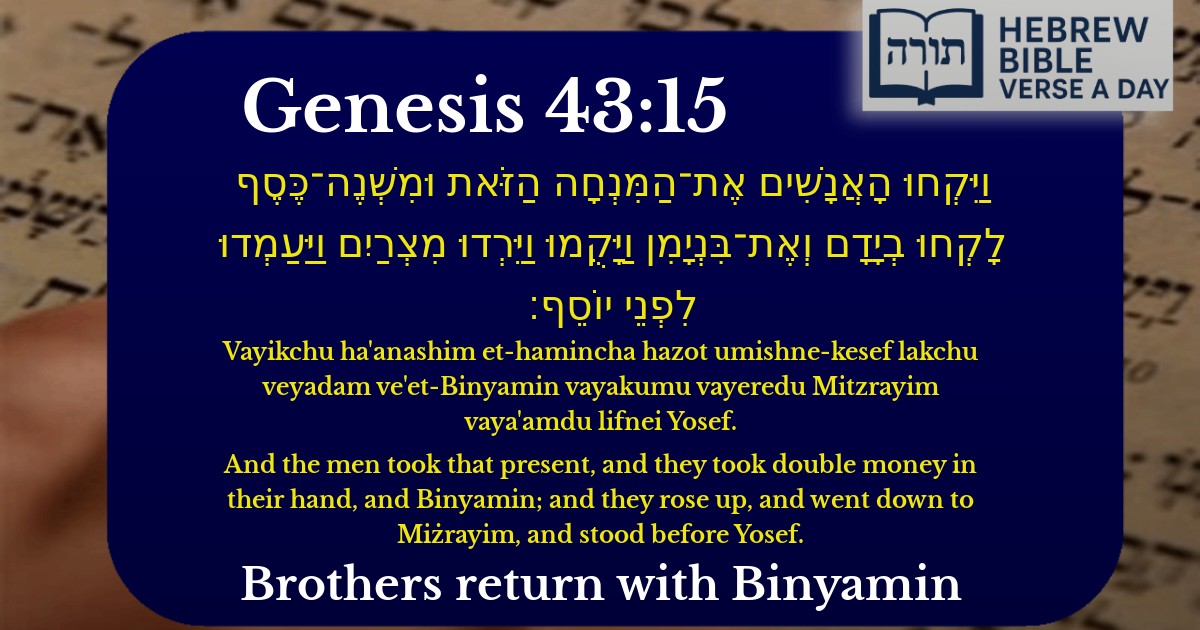Join Our Newsletter To Be Informed When New Videos Are Posted
Join the thousands of fellow Studends who rely on our videos to learn how to read the bible in Hebrew for free!
Hebrew Text
וַיִּקְחוּ הָאֲנָשִׁים אֶת־הַמִּנְחָה הַזֹּאת וּמִשְׁנֶה־כֶּסֶף לָקְחוּ בְיָדָם וְאֶת־בִּנְיָמִן וַיָּקֻמוּ וַיֵּרְדוּ מִצְרַיִם וַיַּעַמְדוּ לִפְנֵי יוֹסֵף׃
English Translation
And the men took that present, and they took double money in their hand, and Binyamin; and they rose up, and went down to Miżrayim, and stood before Yosef.
Transliteration
Vayikchu ha'anashim et-hamincha hazot umishne-kesef lakchu veyadam ve'et-Binyamin vayakumu vayeredu Mitzrayim vaya'amdu lifnei Yosef.
Hebrew Leining Text
וַיִּקְח֤וּ הָֽאֲנָשִׁים֙ אֶת־הַמִּנְחָ֣ה הַזֹּ֔את וּמִשְׁנֶה־כֶּ֛סֶף לָקְח֥וּ בְיָדָ֖ם וְאֶת־בִּנְיָמִ֑ן וַיָּקֻ֙מוּ֙ וַיֵּרְד֣וּ מִצְרַ֔יִם וַיַּֽעַמְד֖וּ לִפְנֵ֥י יוֹסֵֽף׃
וַיִּקְח֤וּ הָֽאֲנָשִׁים֙ אֶת־הַמִּנְחָ֣ה הַזֹּ֔את וּמִשְׁנֶה־כֶּ֛סֶף לָקְח֥וּ בְיָדָ֖ם וְאֶת־בִּנְיָמִ֑ן וַיָּקֻ֙מוּ֙ וַיֵּרְד֣וּ מִצְרַ֔יִם וַיַּֽעַמְד֖וּ לִפְנֵ֥י יוֹסֵֽף׃
🎵 Listen to leining
Parasha Commentary
📚 Talmud Citations
This verse is not quoted in the Talmud.


Context of the Verse
This verse (Bereshit 43:15) describes the moment when Yosef's brothers return to Egypt with Binyamin, bringing gifts and double the money they had previously found in their sacks. This occurs after Yaakov reluctantly agrees to send Binyamin with them, following Yehudah's guarantee of his safety.
Key Themes and Interpretations
Moral and Ethical Lessons
The brothers' actions reflect their growth in integrity and responsibility. By returning the money and safeguarding Binyamin, they demonstrate a commitment to rectifying past mistakes. The Sforno emphasizes that their willingness to face Yosef again—despite their fear—shows their dedication to securing food for their family, fulfilling the mitzvah of providing for one's household.
Symbolism of the Gifts
The minchah (gift) they brought—comprising choice fruits, honey, and spices (Bereshit 43:11)—symbolizes reconciliation. The Talmud (Chullin 91a) connects these offerings to the future gifts brought by the tribes, suggesting that their act of bringing tribute anticipates the unity of the twelve tribes under Yosef's leadership in Egypt.